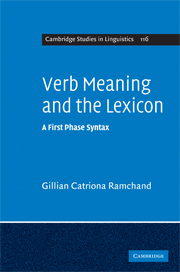3 - A first-phase syntax
Published online by Cambridge University Press: 10 October 2009
Summary
In the previous chapter, I argued for a small set of basic argument relations that are implicated in the linguistic construction of eventive predication. In what follows, I will tie these argument relations to a syntactically represented event decomposition. The reason for this move is the claim that the generalizations at this level involve a kind of systematicity and recursion that is found in syntactic representations. The strongest hypothesis must be that the recursive system that underlies natural language computation resides in one particular module that need not be duplicated in other modules of grammar (i.e. in the lexicon, or in the general cognitive system). At the same time, this means that the semantics that is compositionally built up by the syntax at this level can only include those aspects of meaning that are genuinely predictable and systematic – many aspects of meaning that are traditionally included in descriptions of lexical verbs (e.g. thematic roles, certain kinds of semantic selection) must be excluded. The modularity that this involves has already been acknowledged within many theories of the lexicon as the difference between grammatically relevant lexical information and more general conceptual information, although the separation has mostly been argued to be internal to the lexicon itself (Hale and Keyser 1993, Jackendoff 1990, Grimshaw 1990, Kaufmann and Wunderlich 1998, Levin and Rappaport Hovav 1995). The approach here is a little different in that the grammatically relevant information actually comes from the interpretation of the syntactic structures that the verbs participate in. Any concrete proposal along these lines inevitably involves making a decision about which aspects of meaning should be represented in the syntactic system and which should be seen as coming from lexical-encyclopedic content.
- Type
- Chapter
- Information
- Verb Meaning and the LexiconA First Phase Syntax, pp. 38 - 62Publisher: Cambridge University PressPrint publication year: 2008
- 6
- Cited by



